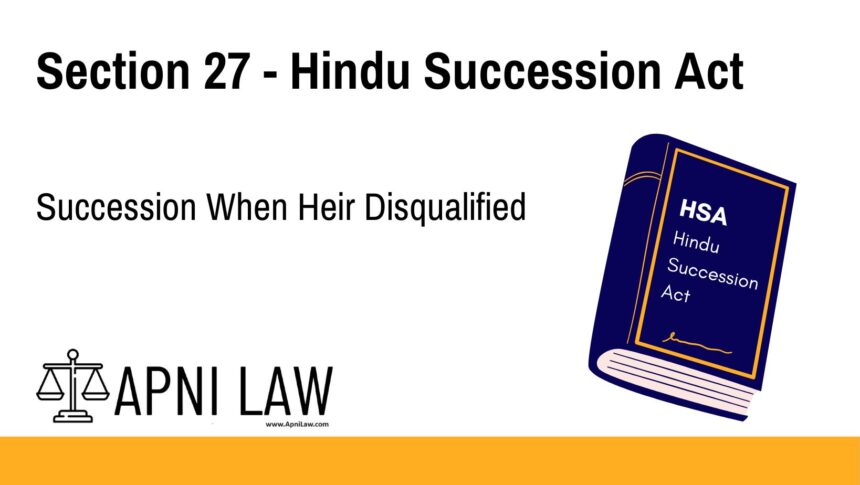Code: Section 27 – Succession When Heir Disqualified
If any person is disqualified from inheriting any property under this Act, it shall devolve as if such person had died before the intestate.
Explanation of Section 27 of the Hindu Succession Act
Section 27 of the Hindu Succession Act, 1956 addresses the situation when a person who is otherwise entitled to inherit property is disqualified from doing so. In such cases, the law deems that the disqualified person has died before the intestate (the person who has died without leaving a will), and the property will devolve accordingly to the next eligible heir.
Key Points:
- Disqualification Triggers: Disqualification can occur for various reasons, such as a person being convicted of a crime like murder (Section 25), being a convert to another religion (Section 26), or other circumstances provided under the Act.
- Effect of Disqualification: The disqualified person is treated as though they predeceased the intestate, meaning their share in the estate will pass to the next eligible heir.
This ensures that property is distributed according to the succession laws, without allowing disqualified heirs to benefit from it.
Illustration
Example 1: Disqualified Heir Due to Murder
Suppose a person is disqualified from inheriting under Section 25 (due to being convicted of murder). If this person was an eligible heir of the deceased, Section 27 states that their share will pass to the next heir in line, as though they had already passed away before the intestate.
Example 2: Disqualified Heir Due to Conversion
If an heir is disqualified under Section 26 due to conversion to another religion, their share will pass to the next eligible heir as though they predeceased the deceased person.
Common Questions and Answers on Section 27 Hindu Succession Act
1. What happens if a disqualified person was supposed to inherit the property?
The property will pass as if the disqualified person had died before the intestate, meaning the next rightful heir in line will inherit the property.
2. Can a disqualified person ever inherit the property?
No. If a person is disqualified under any provision of the Hindu Succession Act, they will not inherit the property, and the estate will pass to other heirs.
3. How does this affect the distribution of property among other heirs?
The disqualified person’s share will be distributed among the other legal heirs according to their order of succession.
4. Does this apply to all heirs?
Yes, this applies to any heir who is disqualified, whether they are the primary heir or a collateral heir.
Conclusion
Section 27 of the Hindu Succession Act ensures that property is inherited by eligible heirs only. If an heir is disqualified for any reason, their share in the property is passed to the next in line, as if they had died before the deceased. This provision helps maintain the integrity of succession and ensures that only qualified heirs inherit the estate.
For more detailed explanations on succession laws and related disqualifications, visit ApniLaw — your trusted resource for simplified legal information.








